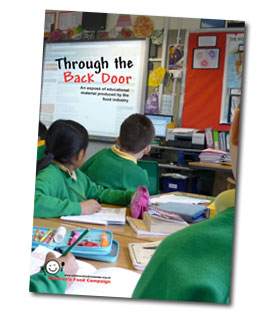News • Children's Food Campaign
Food industry are misleading children and advertising in the classroom
Children as young as five are being taught in school that cheese is a 'nutritional goldmine”, that crisps are healthier than apples and that refilling empty drinks bottles with tap water is unsafe, according to a report released today by the Children's Food Campaign.
 The exposé, called 'Through the back door', has found that food companies are increasingly cooking up their own lesson plans to promote products to children. It finds that many of the curriculum packs produced by companies contain misleading or incorrect information. The Children's Food Campaign came across packs teaching children that they should include fatty or sugary food as part of their breakfast; that overweight children should not eat less food; and that soft drinks are made with “gooditives”, an invented term to put a positive spin on artificial additives.
The exposé, called 'Through the back door', has found that food companies are increasingly cooking up their own lesson plans to promote products to children. It finds that many of the curriculum packs produced by companies contain misleading or incorrect information. The Children's Food Campaign came across packs teaching children that they should include fatty or sugary food as part of their breakfast; that overweight children should not eat less food; and that soft drinks are made with “gooditives”, an invented term to put a positive spin on artificial additives.
Meanwhile, the advertising companies responsible for producing these materials boast of offering companies a “captive audience of some 7.5 million young people, their teachers, school managers, governors, parents and the wider community”.
Two thirds of the curriculum packs that the Children's Food Campaign surveyed contained company logos on materials accessed by children, two thirds contained promotions for a product and two thirds contained misinformation. Every pack surveyed had at least one of the above problems. In one of the more blatant promotions, Vimto encouraged teachers in more than a thousand schools to use English lessons to promote the sugary soft drink. Pupils were urged to write a poem in praise of Vimto for National Poetry Day.[1]
“We were flabbergasted by some of the claims in these packs” , said Campaign Coordinator Richard Watts. “We found nutrition lesson plans about the benefits of eating crisps, claiming that colourings in fizzy drinks were to restore the fruit's natural colour, and telling children to only eat fruit and vegetables in moderation. Promoting junk food in the classroom under the guise of education is unacceptable.”
He added: “The dodgy claims in these packs are written to be taught to children as fact in a lesson. Parents may have no idea that this is happening. Our investigation shows that the food industry cannot be trusted to provide children with unbiased nutritional information.”
Report co-author Lianna Hulbert said: “It is ironic that while many of these claims would be stopped in television or printed advertising, there are no restrictions on promoting them to schools to be taught in a classroom. The materials used to teach our children are totally unregulated. It's time to go beyond toothless 'guidelines'. If we can monitor these packs, why can't the Department for Children, Schools and Families?”
For most children, school is the main source of nutritional and dietary information. At an age when dietary habits are being formed, it is unacceptable, and potentially harmful, to have incorrect information being taught in the classroom.
The claims criticised in the report range from those which are misleading (conflating sugar with other carbohydrates); through those which are highly questionable but are presented as fact (there is no such thing as good and bad foods); to those which are just plain wrong (unhealthy people should eat more cheese).
Currently, commercial activities in schools are covered by guidelines produced by Department for Children, Schools and Families and an industry body, the Incorporated Society for British Advertisers. The guidelines encourages companies to promote products which meet the nutritional standards for schools; and advises against “excessive” sales messages and branding. What constitutes “excessive” is not defined. Research by the Children's Food Campaign show that the guidelines are regularly flouted with impunity.
Christine Blower, Acting General Secretary of the National Union of Teachers said: “The NUT is concerned that children are not exploited or misled by marketing of food products which make claims that are best ambiguous or open to interpretation.”
Parent Jackie Schneider, founder of the campaign group Merton Parents for Better Food in Schools, said: "This is such a con! The food companies know how much pressure teachers are under so 'helpfully' produce these crude advertisements disguised as glossy curriculum packs. I can see why the food companies do it - I can't be the only parent whose child is convinced that if Miss Smith says it in class it must be true!"
Professor Jack Winkler, Director of the Nutrition Policy Unit at London Metropolitan University said: “It is no use the government improving cooked lunches in canteens, if they allow commercials in the classroom. We have an epidemic in childhood obesity underway. Yet the Food and Drink Federation claims that "children should not reduce food intake to lose weight", and the government let's them get away with it! This is a public-private partnership to peddle propaganda.”
UK companies spend an estimated £300 million every year on advertising in the classroom.
- Ends -
For more information or comment, please contact Richard Watts on 07710 782719.
Download the report as a 733kb PDF
Notes to editors:
1. The Children's Food Campaign works to improve children's health and well-being through better food - and food teaching - in schools, and protecting children from junk food marketing. We are supported by over 300 national and local organisations and 12,000 members of the public. The Children's Food Campaign is coordinated by Sustain: the alliance for better food and farming and is funded by the British Heart Foundation.
2. A survey carried out by YouGov in January 2008 showed that: four fifths of people (83%) expect public services to check information or resources provided as part of corporate sponsorship to ensure that they aren't inaccurate or biased. The majority of people didn't want public services to accept sponsorship from companies that: produce or promote food with a high fat content (63%); or produce or promote high sugar drinks (61%)
Source: Public Sector Guidelines on Commercial Sponsorship, available to download at http://www.fhascot.org.uk/faha/1914.html
Three in five (61%) think that corporate sponsorship implies that the organisation in receipt of funding endorses the company or product. Jazzy Media, a company specialising in advertising to school pupils, boasted of their scheme for product sampling in school canteens that samples arrive in children's lunchboxes with “implicit product endorsement of school canteen staff”[2].
3. The quote that in-classroom advertising offers a ”captive audience of some 7.5 million young people, their teachers, school managers, governors, parents and the wider community” is from .http://www.magentaonline.co.uk/howWeWork_FAQs.asp
4. The figure of £300 million spend on classroom advertising comes from the NUT document on Using Commercial Material in Schools http://www.teachers.org.uk/resources/pdf/commercialisation_guidance.pdf
5. The DCSF and ISBA guidelines are available at: http://www.isba.org.uk/isba/protecting/current-issues/working-with-schools
The Committee on Advertising Practice (CAP) code restricts advertising which would “give a misleading impression of the nutritional or health benefits of the product as a whole” and rules out including health claims in adverts which are aimed at children, unless they are for fruit and vegetables.[3] It also states that “marketers should not exaggerate a product's performance or mislead about the child's likely experience of that product.”[4] However, The CAP code does not cover teaching packs used in the classroom and so many of these packs are able to contain claims that would be disallowed in conventional advertising:
- The European Snack Association's curriculum pack – sponsored by Pringles, KP, Walkers and Red Mill – claims that “Chips...are also a rich source of dietary fibre, provide some important vitamins and minerals....Many people believe that chips are unhealthy because they are processed and contain high fat and sodium (salt). Despite their salty taste, chips contain less salt per gram than bread and many popular breakfast cereals. Frequently an apple is perceived as being healthier alternative because it is natural, unprocessed and rich in vitamins and minerals. In the table below a comparison is made between the nutrient content of a 30g bag of chips and an apple. As you can see the bag of chips provides from twice to thirty times as much of all the vitamins and minerals, three times as much energy, more fibre and complex carbohydrate. So how do you define a healthier food - one that is nutritionally inferior?”[5]
- The Food and Drink Federation's curriculum pack includes the admonition “...children should not reduce food intake to lose weight.”[6]
- Britvic's curriculum pack includes a picture on the chart of how soft drinks are made shows that 'gooditives' are one of the ingredients[7].
- The British Soft Drinks Association's curriculum pack claims “Colours restore the colour lost from food during processing and also make the food look brighter.”[8]
[1] http://archive.lancashireeveningtelegraph.co.uk/2004/9/15/468728.html
[2] Jazzy Media (2002) 'Lunch Box: Food and drink sampling in school canteens' 2003/2003 rate card; London: Jazzy Media.
[3] Full text at http://www.asa.org.uk/cap/codes/cap_code/ShowCode.htm?clause_id=1731
[4] http://www.asa.org.uk/cap/advice_online/advice_online_database/Show+Entry.htm?advice_online_id=43
[5] http://www.esa.org.uk/education/english/label/index-label.htm
[6] http://www.jointheactivaters.org.uk/jta/about_diet.aspx
[7] http://www.britvic.co.uk/PDF/Billy/17_July_story_of_billy_chart_hi_res.pdf
Published Monday 5 January 2009
Children's Food Campaign: Better food and food teaching for children in schools, and protection of children from junk food marketing are the aims of Sustain's high-profile Children's Food Campaign. We also want clear food labelling that can be understood by everyone, including children.





